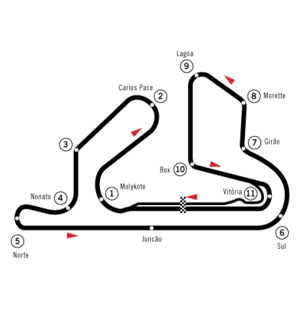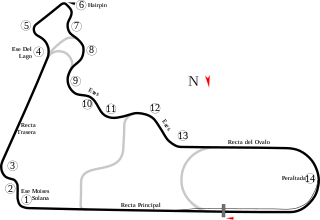
The 1988 Brazilian Grand Prix was a Formula One motor race held on April 3, 1988, at the renamed Autódromo Internacional Nelson Piquet in Rio de Janeiro. Following his 3rd World Drivers' Championship in 1987 the Jacarepaguá Circuit was named after local hero Nelson Piquet. It was the first race of the 1988 Formula One season.

The 1988 French Grand Prix was a Formula One motor race held on 3 July 1988 at the Circuit Paul Ricard, Le Castellet. The race, contested over 80 laps, was the seventh race of the 1988 Formula One season and was won by Alain Prost, driving a McLaren-Honda, with teammate Ayrton Senna second and Michele Alboreto third in a Ferrari.

The 1988 Belgian Grand Prix was a Formula One motor race held at the Circuit de Spa-Francorchamps on 28 August 1988. It was the eleventh race of the 1988 Formula One World Championship.

The 1988 Australian Grand Prix was a Formula One motor race held at the Adelaide Street Circuit on 13 November 1988. It was the sixteenth and final race of the 1988 Formula One World Championship, and the last race for which turbocharged engines would be eligible until the 2014 Australian Grand Prix.

The 1989 Brazilian Grand Prix was a Formula One motor race held at Jacarepaguá, Rio de Janeiro on 26 March 1989. It was the first race of the 1989 Formula One World Championship.

The 1989 Mexican Grand Prix was a Formula One motor race held at the Autódromo Hermanos Rodríguez, Mexico City on 28 May 1989. The race, contested over 69 laps, was the fourth race of the 1989 Formula One season and was won from pole position by Ayrton Senna, driving a McLaren-Honda, with Riccardo Patrese second in a Williams-Renault and Michele Alboreto third in a Tyrrell-Ford.

The 1989 French Grand Prix was a Formula One motor race held at Paul Ricard on 9 July 1989. It was the seventh race of the 1989 Formula One World Championship.

The 1989 Belgian Grand Prix was a Formula One motor race held at Spa-Francorchamps on 27 August 1989. It was the eleventh race of the 1989 Formula One World Championship.

The 1989 Spanish Grand Prix was a Formula One motor race held at Jerez on 1 October 1989. It was the fourteenth race of the 1989 Formula One World Championship.

The 1990 United States Grand Prix was the opening motor race of the 1990 Formula One World Championship held on March 11, 1990, in Phoenix, Arizona. It was the 32nd United States Grand Prix since the American Grand Prize was first held in 1908, and the 25th under Formula One regulations since the first United States Grand Prix was held at Sebring, Florida in 1959. It was the second to be held on the streets of Phoenix and ran over 72 laps of the 4 km-circuit.

The 1990 German Grand Prix was a Formula One motor race held at the Hockenheimring on 29 July 1990. It was the ninth race of the 1990 Formula One World Championship. The race was the 52nd German Grand Prix and the 14th to be held at the Hockenheimring. It was the 39th and last Formula One Grand Prix to be held in West Germany prior to its re-unification with East Germany. The race was held over 45 laps of the seven kilometre circuit for a race distance of 306 kilometres.
Stefano Modena is a former racing driver from Italy. He participated in 81 Formula One Grands Prix, debuting on November 15, 1987. He achieved 2 podiums, and scored a total of 17 championship points.
Gregor Foitek is a Swiss former racing driver. He won the 1986 Swiss Formula 3 Championship. Moving up to Formula 3000 he was widely blamed for causing a race-stopping crash at Brands Hatch in 1988, the restart of which led to a second major crash on the first lap in which Johnny Herbert sustained major leg injuries. Foitek participated in 22 Formula One Grands Prix, debuting on 26 March 1989. He scored no championship points. He later made two CART starts for Foyt Enterprises in 1992 but was knocked out of both races by mechanical issues.
Oscar Rubén Larrauri is a racing driver from Argentina. He participated in 21 Formula One Grands Prix, all with the EuroBrun team, debuting at the 1988 Brazilian Grand Prix. He scored no championship points, only qualifying 8 times.
EuroBrun Racing was an Italo-Swiss Formula One constructor based in Senago, Milan, Italy. They participated in 46 grands prix, entering a total of 76 cars.
Onyx Grand Prix is a former Formula One constructor from Britain that competed in the 1989 and 1990 Formula One seasons. The team participated in 26 World Championship Grands Prix and scored six World Constructors' Championship points. Its best result was third place, in the 1989 Portuguese Grand Prix, for Stefan Johansson.
The Brun C91 was a sports prototype built for Group C racing in the 1991 World Sportscar Championship season. It was built by Walter Brun's Brun Motorsport of Switzerland, by a team which included Steve Ridgers, John Iley and Hayden Burvill. It is the only car that Brun has built to date.
The 1988 Formula One Indoor Trophy took place on December 7–8 at the Bologna Motor Show. The winner was Luis Pérez-Sala in a Minardi-Ford.

The Lola LC88 is a Formula One car that the Larrousse team used to compete in the 1988 and one race in the 1989 Formula One season. It was an evolution of the previous LC87 model, except for major changes to the front suspension.

The EuroBrun ER189 and ER189B were Formula One cars built and raced by the EuroBrun team for the 1989 and 1990 Formula One seasons. The cars were designed by George Ryton and were powered by a normally aspirated Judd EV engine.










